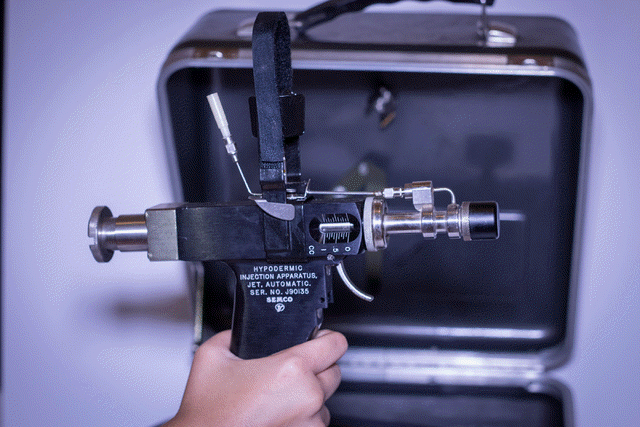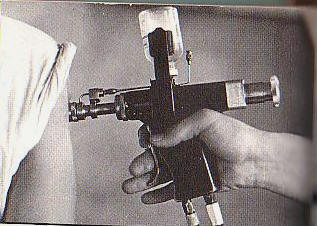|
|
|||||||||||||||||||||||||||||||||
|
|
|||||||||||||||||||||||||||||||||
|
Am Fam Physician. 1996 Nov 1.
Viral infection as a cause of arthritis. Finch University of Health Sciences/Chicago Medical School, Illinois, USA. Abstract
Rheumatic complaints secondary to viral infections
are usually brief, self-limited and nondestructive.
They may accompany almost any type of viral illness,
and the arthritic presentation is nonspecific. These
manifestations are protean, ranging from arthralgia
to vasculitis. Often the cause of the rheumatic
complaint remains elusive because of the prompt
resolution of the viral infection. Evaluation for
autoimmune diseases should be postponed until the
symptoms have been present for at least six weeks.
However, some viral diseases, such as parvovirus,
chronic hepatitis B virus and hepatitis C virus
infections, can produce long-lasting rheumatic
symptoms. Since the arthritisassociated with
hepatitis C infection has only recently been
recognized, it is important to search for this
association in patients who have atypical rheumatic
complaints, risk factors for hepatitis and
alterations in liver enzymes, so that an accurate
diagnosis can be established and the pathophysiology
can be better understood.
http://www.ncbi.nlm.nih.gov/pubmed/8900360 Best Pract Res Clin Rheumatol. 2003 Apr Virus-associated arthritis.
Institute of Medical Science
The occurrence of arthritis in patients who
were infected by a virus has been widely observed. In
some cases, the clinical appearance seems to resemble
that of rheumatoid arthritis. The mechanism by which the
viral infection proceeds to the arthritic manifestation
is, however, still to be investigated. Several
biological and immunological pathways are suggested to
be involved in the pathogenesis. The representatives of
such potentially 'arthritogenic' viruses include human
T-cell lymphotropic virus type I (HTLV-I), which causes
destructive inflammatory arthritis in model animals.
Other examples are hepatitis C virus and rubella virus.
Clinical and pathological features of these
virus-induced forms of arthritis are discussed.
Joint Bone Spine. 2006 Dec.
Rheumatologic manifestations of chronic hepatitis C infection. Rheumatology Department and INSERM ERI-18, Avicenne Teaching Hospital (AH-HP) and Paris 13 University, 125, rue de Stalingrad, 93009 Bobigny, France. Abstract The many rheumatologic manifestations associated with chronic hepatitis C virus (HCV) infection include arthralgia, myalgia, arthritis, vasculitis, and sicca syndrome. Arthralgia is the most common extrahepatic manifestation and may indicate mixed cryoglobulinemia or an adverse reaction to interferon therapy. HCV arthritis unrelated to cryoglobulinemia is far less common but constitutes an independent entity. The picture may mimic rheumatoidarthritis (RA), particularly as rheumatoid factor is present in 50-80% of cases. Tests are usually negative for antibodies to cyclic citrullinated peptides (anti-CCP), which may help to differentiate the two conditions. The management of HCV arthritis is empirical and poorly standardized. Although low-dose glucocorticoid therapy, hydroxychloroquine, and methotrexate have been used successfully in several patients, little is known about their hepatic safety profile. Arthritis associated with cryoglobulinemia usually responds to antiviral treatment. Sicca syndrome is common in patients with chronic HCV infection and shares similarities with primary Sjögren syndrome, suggesting that HCV infection may deserve to be included among the causes of secondary Sjögren syndrome. HCV-associated vasculitis is usually related to cryoglobulinemia, although a few cases of polyarteritis nodosa-like disease affecting the medium-sized vessels have been reported. Other conditions reported in patients with chronic HCV infection include fibromyalgia, systemic lupus erythematosus (SLE), antiphospholipid syndrome, and osteosclerosis. http://www.ncbi.nlm.nih.gov/pubmed/10910182
Rheum Dis Clin North Am. 2003 Feb;29(1):111-22. Hepatitis C virus and arthritis.
Lucania Department of Rheumatology, San
Carlo Hospital, Contrada Macchia Romana,
Potenza 85100, Italy
Abstract
Arthritis is one of the several autoimmune disorders induced by HCV infection. There is not a specific clinical pattern of HCV-related arthritis, but two nonerosive subsets have more frequently been described: a RA-like polyarthritis and a less common mono-oligoarthritis involving medium-sized and large joints, often showing an intermittent course. This latter form is associated with the presence of serum cryoglobulins. Because of its variable characteristics, HCV-related arthritis must be considered in the differential diagnosis of many patients having inflammatory joint involvement. Antikeratin antibodies and possibly IgA RF can be useful in distinguishing between RA and HCV-related RA-like polyarthritis. In fact, these tests are highly specific in RA patients. In any case, the search for HCV antibodies should be more widely performed in the diagnostic approach to rheumatic diseases. An association between PsA and HCV infection has been described in the literature, but the authors were unable to confirm these data. Nonsteroidal anti-inflammatory drugs, hydroxychloroquine, and low doses of corticosteroids are the cornerstones of the treatment of HCV-related arthritis. An etiologic therapy with alpha-interferon and ribavirin is useful when required by hepatic or systemic involvement; such therapy could also be considered in selected cases of isolated arthritis that are unresponsive to other drugs. Few case reports described the onset of polyarthritis after the administration of alpha-interferon for HCV-related chronic hepatitis. This topic should be more accurately studied in the future to exclude a spurious association between the two events. http://www.ncbi.nlm.nih.gov/pubmed/12635503
Curr Opin Rheumatol. 2000 Jul;12(4):295-9.
Hepatitis C-associated arthritis.
|
|
|
|





